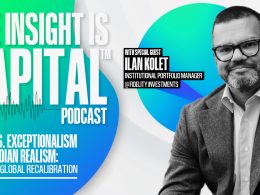Here is the full transcript of this interview with Chuck Royce and Consuelo Mack below. Although this interview was originally aired early this year, there is much to be gleaned from it, as it remains relevant at present.
Consuelo Mack WealthTrack - June 3, 2011
*Originally Aired - February 4, 2011
CONSUELO MACK: This week on WealthTrack, a television exclusive with Great Investor Chuck Royce. This legendary small company stock fund manager explains why small is still beautiful for investors, next on Consuelo Mack WealthTrack.
Hello and welcome to this edition of WealthTrack. I’m Consuelo Mack. This week we have a rare treat for all of you: an exclusive television interview with investment legend, Charles, “Chuck” Royce, whose name is synonymous with small company stocks. This great value investor has specialized in small company stocks since he took over his flagship, Royce Pennsylvania Mutual Fund, 35 years ago. Since then the fund has clocked an average annualized total return of nearly 15%, handily beating the market with less than market volatility. Over the last three decades the Royce and Associates fund family has expanded to 24 micro-cap, small and midcap value funds, 13 of which are managed or co-managed by Royce himself, and three with his assist.
The so-called small cap universe has more than come into its own in the three plus decades since the pioneering Royce recognized its value. There are more than 3,100 U.S. companies identified as micro-cap with market values of up to $500 million; more than 1,100 small-cap with market values between $500 million and $2.5 billion; and more than 600 companies categorized as U.S. mid-cap with stock market values between $2.5 and $15 billion. Then there are the foreign small company stocks. By Royce’s count, this market consists of more than 15,000 companies in the developed world alone. And Royce just launched three new international funds to take advantage of what he believes are exceptional opportunities overseas.
Until very recently, small has been beautiful for investors. Small company stocks have left their larger siblings in the dust. Since the market meltdown, the Russell 2000, considered to be a proxy for American small company stocks, has skyrocketed more than 130% and has outperformed the S&P 500 over the last three, five, and ten year periods. The downside? Small company stocks come with more volatility than their large cap brethren, on both the upside and the downside.
Recently small cap stocks have shown some vulnerability, leading many investors to say that relatively undervalued large caps will finally dominate. Chuck Royce has some definite thoughts about that, but I began by asking him why he decided to focus on small company stocks in the first place and why he has stuck with them ever since.
CHUCK ROYCE: It wasn’t called small caps in those days. It was just sort of an aggressive form of money management, which used small stocks, but there was no such thing as a small stock category or any kind of theoretical thinking around why that was a good idea. It just sort was the more riskier end of the world. That’s what I did and that’s what I had sort of grown up in my research activities.
CONSUELO MACK: So why have you stuck with small-cap as a focus?
CHUCK ROYCE: Well, it turned out it’s a very, very attractive area all the time. It turns out that it’s an evergreen universe with stocks always being introduced into the class. There are IPOs every year, in a good year 300 or 400, in a bad year 100, maybe. There are always spin-offs. There are always large companies following down becoming small companies. So there’s lots of new material. It’s a very big universe. It’s thousands of companies, 6,000- 7,000 companies. It’s several trillion dollars worth of merchandise. So it’s big enough and it’s evergreen.
CONSUELO MACK: There is a perception, and you actually kind of just mentioned it, there is a perception that small-cap is a risky category. How risky is it?
CHUCK ROYCE: Yes. It’s both true and untrue. The category itself is more volatile than large caps. There is no question about it. But a sort of carefully designed way of looking at it can reduce volatility substantially, and I believe with sort of proper understanding you can select portfolios that will perform better than the universe with less volatility. And that’s what we try to do.
CONSUELO MACK: Let’s talk about that because in fact, that is something that you have done very successfully for the last 35 years, is that you have beaten the market with less volatility consistently over the long run. How have you done that? How do you construct your portfolios to accomplish that?
CHUCK ROYCE: It is that old-fashioned word a value approach. I don’t happen to love the word because it’s sort of an overused word. It’s kind of a cliché word. I prefer thinking of us as risk managers and that our idea is to reduce risk in any given stock, and therefore reduce risk in the portfolio, and I truly believe you can do that within this very, very large, much more volatile universe. You can select portfolios that will perform better with less risk.
CONSUELO MACK: Can you give us a for-instance of maybe choices that you have made recently? I mean, there are 500 some odd securities in your flagship Pennsylvania Mutual Fund. So how do you-- give me an example.
CHUCK ROYCE: There is probably more to it than just risk reduction. We are always thinking about the risk-return ratio. We are absolute investors, not relative investors, so we are focusing on absolute returns, which would mean simply if we buy something, we expect to make a lot of money, and in dollars, not just relative to an index. So that focus of absolute returns and then ultimately comparing the return to what we think is the risk- we don’t really know- is the system. Now, there’s nothing very unique about that. It’s applying what I would call very standardized logic to this volatile universe.
CONSUELO MACK: But when you look at your record, for instance, and I remember there was a statistic about over five-year rolling averages or something that 80% of the time you delivered better than 10% annualized returns.
CHUCK ROYCE: Yes.
CONSUELO MACK: You might be doing what everyone else is doing.











